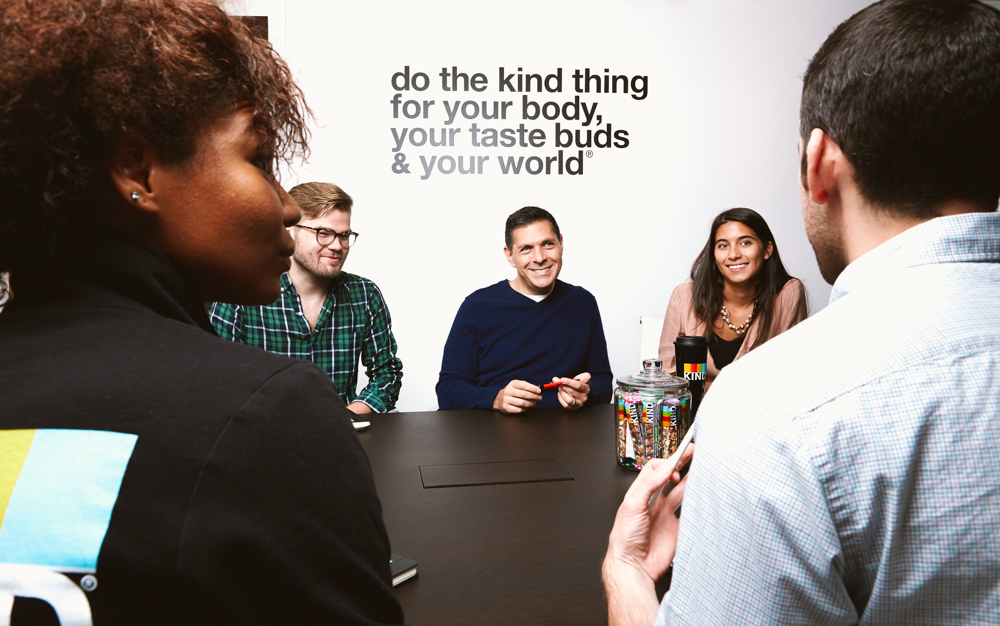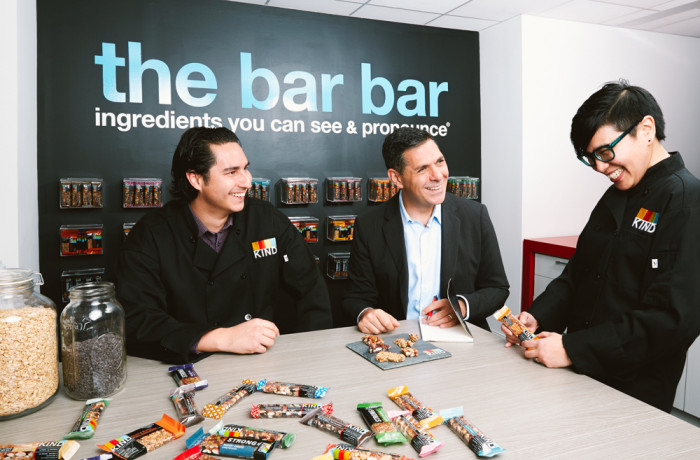Meet The Company That Made Kindness Its Cause
 When you walk into the KIND office, you are met with an open floor plan where the vibrant energy and dedicated mission of the organization is clearly palpable. The office space mirrors the translucent packaging KIND bars are known for, which fosters transparency and lets the wholesome ingredients within do the talking. Despite KIND’s rapid growth over the last few years, the company’s environment and values are more like a close-knit, supportive startup than a successful corporation. Employees are referred to as team members and encouraged to share their work and life goals so that they can grow with the company.
When you walk into the KIND office, you are met with an open floor plan where the vibrant energy and dedicated mission of the organization is clearly palpable. The office space mirrors the translucent packaging KIND bars are known for, which fosters transparency and lets the wholesome ingredients within do the talking. Despite KIND’s rapid growth over the last few years, the company’s environment and values are more like a close-knit, supportive startup than a successful corporation. Employees are referred to as team members and encouraged to share their work and life goals so that they can grow with the company.
If you didn’t know already, the KIND brand is the brainchild of CEO and Founder, Daniel Lubetzky, a visionary who is dedicated to making the world a more peaceful and collaborative place. He is also the founder of PeaceWorks Inc. and the PeaceWorks Foundation’s OneVoice Movement. PeaceWorks is a food company pursuing both profit and peace by fostering cooperative ventures among neighbors in the Middle East. OneVoice is an international grassroots movement that amplifies the voice of mainstream Israelis and Palestinians and empowers them to propel their elected representatives toward a two-state solution. Boiled down into one simple sentence, Lubetzky believes that companies can be not-ONLY-for-profit to deliver quality products that also propel a social mission.
Think Boundlessly. Work Purposefully. Live Passionately.
I had the incredible opportunity to speak with Daniel Lubetzky about his new book, Do The KIND Thing: Think Boundlessly, Work Purposefully, Live Passionately. One hundred percent of the proceeds from the book will go to support individuals embodying the KIND Movement – the company’s mission to inspire kindness in communities everywhere. Daniel was munching on a bowl of fresh blueberries as we sat down to chat about what inspires him, what a typical day in the life looks like, and what advice he has for Conscious readers who want to start something that leaves the world a brighter and better place.
 Q | YOU DEVELOPED AN ENTREPRENEURIAL SPIRIT AT A YOUNG AGE FROM PERFORMING MAGIC SHOWS TO SELLING WATCHES. WHAT INFLUENCED THESE ENTREPRENEURIAL VENTURES? WHAT EXCITES YOU MOST ABOUT BEING YOUR OWN BOSS?
Q | YOU DEVELOPED AN ENTREPRENEURIAL SPIRIT AT A YOUNG AGE FROM PERFORMING MAGIC SHOWS TO SELLING WATCHES. WHAT INFLUENCED THESE ENTREPRENEURIAL VENTURES? WHAT EXCITES YOU MOST ABOUT BEING YOUR OWN BOSS?
I guess I was influenced by the osmosis of watching my dad. He was a self-made man with only a third grade education. He made his success so I watched and learned from his self-sustaining and maintaining example. Now that I have a six year old I ask myself, how do you inculcate initiative? I think it’s from learning and watching so I want to set a good example for him.
And I do not think about myself as being my own boss. I work in a team and my team excites me to create something new and disruptive that does good for society. I am responsible to my team and it is my job to lead and empower them.
Q | IN CHAPTERS 1 AND 2 OF DO THE KIND THING YOU DISCUSS KIND’S “AND” PHILOSOPHY AND PURPOSE. WERE YOU EVER OVERWHELMED BY THE GRAVITY OF THIS PARADIGM SHIFT AND THE OPPOSITION YOU MAY FACE FROM CHALLENGING CONVENTIONAL BUSINESS STRUCTURE AND VALUES?
I’ve been working for 21 years to promote peace in war torn countries and encourage economic cooperation among neighbors. KIND is honestly a walk in the park in comparison to trying to nurture peace in Arab countries in the early 90s. Trying to get people to recognize humanity in a peaceful country is not nearly as difficult as it is in areas that have been at war for decades and even centuries. In the 90s, social entrepreneurship did not exist; people lived in a bipolar world of “for profit” or “not for profit” structured by rigid tax laws. I asked myself, how can we do both? That’s how “not only for profit” was born- to find and use the best of both worlds. I do not reject capitalism, it is a powerful tool to scale and grow. To tackle the immense challenges that our world faces, I think the private sector needs to lead.
Q | CAN YOU GIVE US AN EXAMPLE OF WHAT YOUR AVERAGE DAY LOOKS LIKE?
Well, I don’t really have a typical day so I will take you through my day yesterday. I am usually woken up between 2am and 5am by one of my four children jumping into bed with my wife and I. I try to go back to sleep, but by 6am I am up to get ready for the day. What people find most interesting about my routine is that I brainstorm in the shower. I look forward to thinking and I think it’s really important to have time to think creatively and freely.
Two days a week I take the kids to school and then head into the office. Most of my day is filled with meetings, about 60% being internal with my team and 40% being external. I love the internal meetings- they are intellectually stimulating and brainstorming always helps to validate and improve our operations. I want everyone on the team to take ownership of the products and the company. The external meetings are split between civic projects I am working on, such as education projects trying to get kids to learn from each other, and KIND related projects. I try to get 2-4 hours of email in but interviews, phone calls, and meetings tend to run into that time (Editor’s Note: Thank you for taking the time to speak with Conscious!). I try to leave the office a little after 6 to be home by 6:40pm to see my kids and put them to bed by 8pm. After the kids are in bed, my wife Michelle and I take some time to talk and hang out. Michelle goes to bed around 10:30/11pm and then I head to work on emails and things I didn’t get done during the day. I head to bed around 2am and do it all again.
Q | IN CHAPTER 4: TRUTH AND DISCIPLINE YOU DISCUSS YOUR EARLY EXPERIENCE DEVELOPING PEACEWORKS. WHAT DID YOU LEARN FROM THE ENDEAVOR THAT HELPED YOU BUILD KIND INTO THE COMPANY IT IS TODAY?
I learned to keep my failures close to my heart and mind. You learn so much more from your failures than you do from your successes because they awaken you to do things differently. Failures are the platforms for success. From PeaceWorks I learned that despite having grit and passion, I lacked focus. I tried to do everything in multiple parts of the world from sundried tomato spread products from the Middle East to Dead Sea Mineral skincare products from Jordan. I wanted to be in multiple product categories and in as many stores as possible. From my failures with PeaceWorks I learned that you cannot be everything to everyone- you need to be disciplined and hone in on your unique value proposition. I keep some of the product failures in my office as reminders to stay focused.
Q | HOW DID YOU DEFINE SUCCESS WHEN YOU STARTED? HAS THAT DEFINITION CHANGED ALONG THE JOURNEY AND GROWTH OF KIND?
Since I was a boy I have been very ambitious and a daydreamer, especially as a young man fresh out of law school ready to take on the world. I wouldn’t say my definition of success has changed, but expectations of my potential and what I am capable of has. I never would have imagined how blessed I would be. Success to me does not equal money. I like money because it shows that you run an efficient and effective business. But money is not what drives me. What drives me is creativity and proving people wrong. I want to build bridges between people to help forge success. My heritage and the experience of my father in a Holocaust concentration camp have driven me to try to prevent that from happening to others.
Money is not what drives me. What drives me is creativity and proving people wrong. I want to build bridges between people to help forge success.
Before having kids, all that mattered to me was making an impact in social enterprise. But having kids has changed me and opened my heart in ways I could never have imagined. When my first son was born I loved him so very much. I was nervous when Michelle was pregnant the second time because I didn’t know that I could love anyone more than I loved him. But I learned that your heart can grow and open even more. Success now means raising and nourishing good human beings who find fulfillment in their lives.
Q | YOU SPEAK 4 LANGUAGES, WHICH IS AN INCREDIBLE SKILL! DO YOU THINK THAT SPEAKING MULTIPLE LANGUAGES AND UNDERSTANDING THE CUSTOMS OF A CULTURE HELPS TO FOSTER EMPATHY AND TRUST ABROAD? WHAT CAN AMERICANS AND US COMPANIES DO TO CULTIVATE MORE TRUST AND BUILD PARTNERSHIPS?
I speak 4 languages fluently but I know basic sentences in over 40 others. When I go to a new country, I always try to learn funny proverbs in the native language because it makes people smile. Making someone smile is making an impact and building a bond. It is an effective way to make a connection and show that I care. It often shocks people and shows that I am not afraid to make a fool of myself. I try to practice whenever I can, even if it’s practicing my Bangladesh in a taxicab. This irritates my wife though because all she hears is the same few sentences!
Learning languages is very important; studies show that the brain works better when you know more languages. Knowing other languages opens you to new cultures because there are often words and concepts that don’t exist in all languages. It helps you understand the nuances of a culture and people. Language helps you see the world differently.
Q | WHAT PIECE OF ADVICE WOULD YOU GIVE OUR READERS WHO WANT TO PURSUE SOCIAL ENTREPRENEURSHIP?
I have three pieces of advice for young people. First, talk with yourself. Understand what is important to you, what makes you passionate, and what gives you meaning. You don’t need the answers right away and they can change over time. But let them guide you. Second, don’t feel like you have to start a new venture. You need to get to meaning for yourself. Don’t create for the sake of creating, be true and authentic to yourself (see #1). Social entrepreneurship is growing and more and more people from the younger generations care, which is great. But create something for the right reasons, not for money or a quick gimmick. A social mission should not be a crutch to sell a product. In my opinion, your value proposition should rely on the product and what you are solving for the consumer. And third, separate the process of evaluating the idea from triggering and executing it. During the first part, the evaluation stage, you need to be skeptical and very tough. You need to be comfortable walking away from the idea if it doesn’t work. You need to question everything because you don’t want to waste your life doing something stupid. If after this introspection it is right, then you need to flip a switch and be positive and obsessively focused. At this point, no one should stop you from achieving your mission. There is no room for skepticism.
LEARN + CONNECT
Learn more about KIND Movement. Purchase your copy of Do the KIND Thing
Connect via Facebook, Twitter and Instagram
FROM THE EDITOR
At Conscious, remarkable people and organizations inspire us, and so we set out to tell stories that highlight human-interest stories, global initiatives, innovation, community development, and social impact. You can read more stories like this when you subscribe.
This article is in partnership with KIND Snacks as part of the Do The KIND Thing Campaign.


